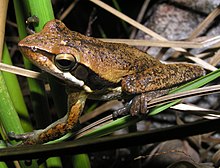| Slender tree frog | |
|---|---|

| |
| Conservation status | |
 Least Concern (IUCN 3.1) | |
| Scientific classification | |
| Domain: | Eukaryota |
| Kingdom: | Animalia |
| Phylum: | Chordata |
| Class: | Amphibia |
| Order: | Anura |
| Family: | Hylidae |
| Genus: | Litoria |
| Species: | L. adelaidensis |
| Binomial name | |
| Litoria adelaidensis (Gray, 1841) | |

| |
| Distribution of the slender tree frog | |
| Synonyms | |
| |
The slender tree frog (Litoria adelaidensis) is a tree frog native to south-western Australia.
Description
As suggested by its name, the slender tree frog has a very slender build. It has a thin, flat body with a pointed snout. The dorsal surface varies in colour, from completely brown or green, to brown with green patches. The flanks of the body have a dark brown or black stripe, which runs from the back leg to the nostril; the line is much narrower between the nostril and the eye. The ventral surface is white, and the inside of the thighs has bright orange spots. The tympanum is large and distinct. The fingers are mostly unwebbed, and the toes are three-quarter webbed. They reach a length of 4.7 centimetres (1.9 in) from snout to vent.
Ecology and behaviour
Males call near a still water source to attract females; the call is a harsh "screech". Breeding occurs in early spring. The slender tree frog is found in permanent swamps and lagoons, often at the water's edge among the vegetation.
References
- Jean-Marc Hero & Dale Roberts (2004). "Litoria adelaidensis". IUCN Red List of Threatened Species. 2004: e.T41079A10397284. doi:10.2305/IUCN.UK.2004.RLTS.T41079A10397284.en.
- ^ Frost, Darrel R. (2017). "Litoria adelaidensis (Gray, 1841)". Amphibian Species of the World: an Online Reference. Version 6.0. American Museum of Natural History. Retrieved 1 January 2018.
- Barker, J.; Grigg, G.C.; Tyler, M.J. (1995). A Field Guide to Australian Frogs. Surrey Beatty & Sons. ISBN 978-0-949324-61-0.
| Taxon identifiers | |
|---|---|
| Litoria adelaidensis |
|
| Hyla adelaidensis | |
This Pelodryadinae article is a stub. You can help Misplaced Pages by expanding it. |